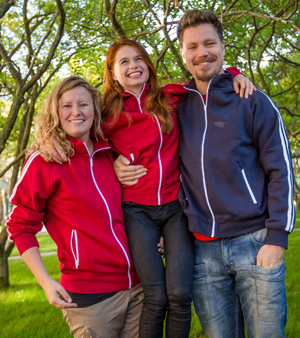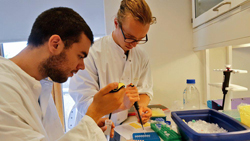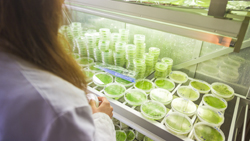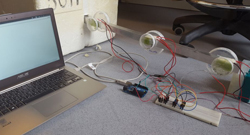KU students win gold in the United States for Mars moss project
Can we develop a moss that can survive and grow on Mars? A group of students from the Center for Synthetic Biology and the Niels Bohr Institute at the University of Copenhagen decided to try. They took the project to the World Championship in Synthetic Biology at the Massachusetts Institute of Technology in Boston and won both gold and two nominations for special awards for Best Environment Project and Best Composite Part.

The three physics students, Christina Toldbo, Jophiel NymanWiis and Victoria Sosnovtseva have good reason to be very happy and proud. They participated in the World Championships in Synthetic Biology at the Massachusetts Institute of Technology in Boston with the SpaceMoss project and won moth gold and two nominations for special awards for the Best Environment Project and Best Composite Part.
“It is crazy that we have done so well. There were 259 projects from around the world and we competed with top universities like MIT, Caltech and Yale,” explains the physics student at the Niels Bohr Institute, Christina Toldbo, who was one of the participants in the Danish project.
It all started in March when three students in molecular biology and molecular biomedicine decided to take part in the World Championship in Synthetic Biology. The project had to be interdisciplinary, so they found three physics students from the Niels Bohr Institute who wanted to participate. In addition, two business students from CBS joined the project and would be responsible for marketing for commercial use and they also a graphic designer. There was also a requirement that they had to create a website and have media outreach.
The competition had different categories and different topics and they decided they wanted to do something with Space and because two of the physics students were connected to the Mars research group at the Niels Bohr Institute, they agreed on Mars as their subject.
Mars is a harsh planet
Manned missions to Mars could become a reality within the near future. But in order for humans to survive on the planet, they will need food and water in addition to surviving the harsh environment. There is actually water on Mars, but it is impossible to bring enough food to stay longer. So the question was, whether you could get plants to grow on the harsh planets?
“We decided to try and develop a moss that could handle temperatures that fluctuate between 20 degrees C during the day and minus 60 degrees at night,” explains Christina Toldbo.
Here on Earth, there organisms that can tolerate extreme cold and the biology students took a particular gene from a caterpillar that produces an antifreeze protein. They spliced the gene into the moss. The physics students built a kind of Martian chamber where they could test the moss with sensors at different temperatures.
The moss survived for 24 hours at minus 20 degrees. In addition to being able to survive and grow on Mars, they developed another property beyond cold tolerance. They wanted it to produce useful substances and medicine that might also be needed for a mission to Mars and they managed to genetically engineer the moss to produce a substance called resveratrol. It is the substance found in red grapes and is what gives the wine healthy properties.
The interest in the SpaceMoss project has been great, both in the media here in Denmark, but also in the United States, where the students were contacted by NASA.
“Who knows,” says Christina Toldbo – “it could be cool to work with the Mars project and I really like working across disciplines.”

Christina Toldbo, Physics student, Niels Bohr Institute, University of Copenhagen, 2855-0468, christina.toldbo@mail.dk
Jophiel Nyman Wiis, Physics student, Niels Bohr Institute, University of Copenhagen, 3119-9442, jophiel@gmail.com



